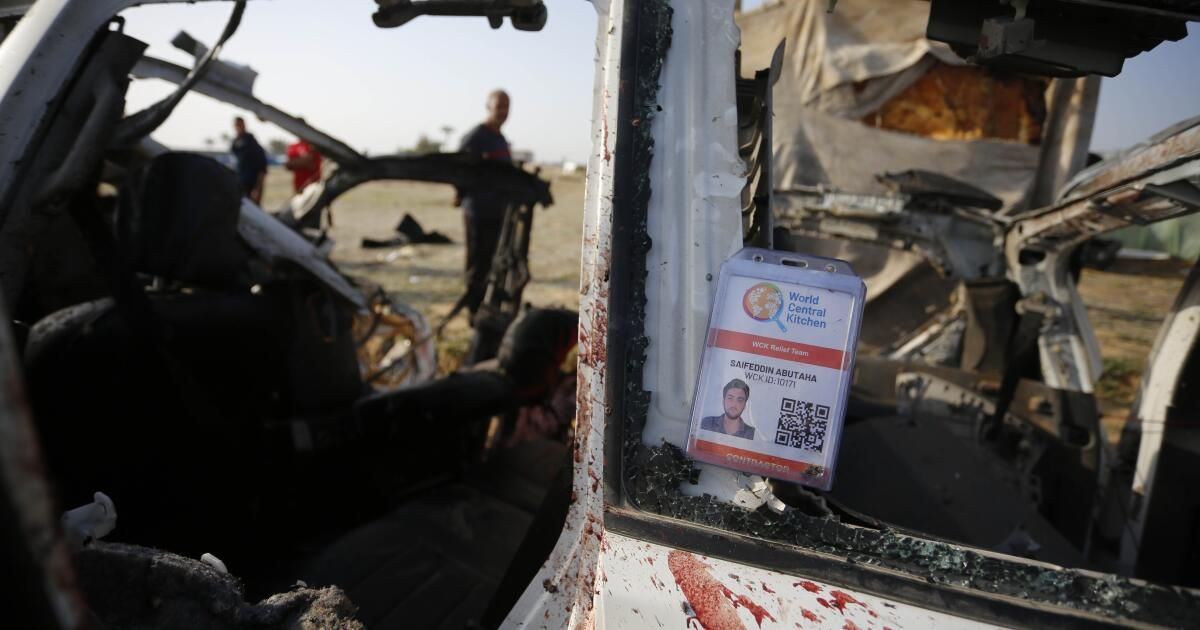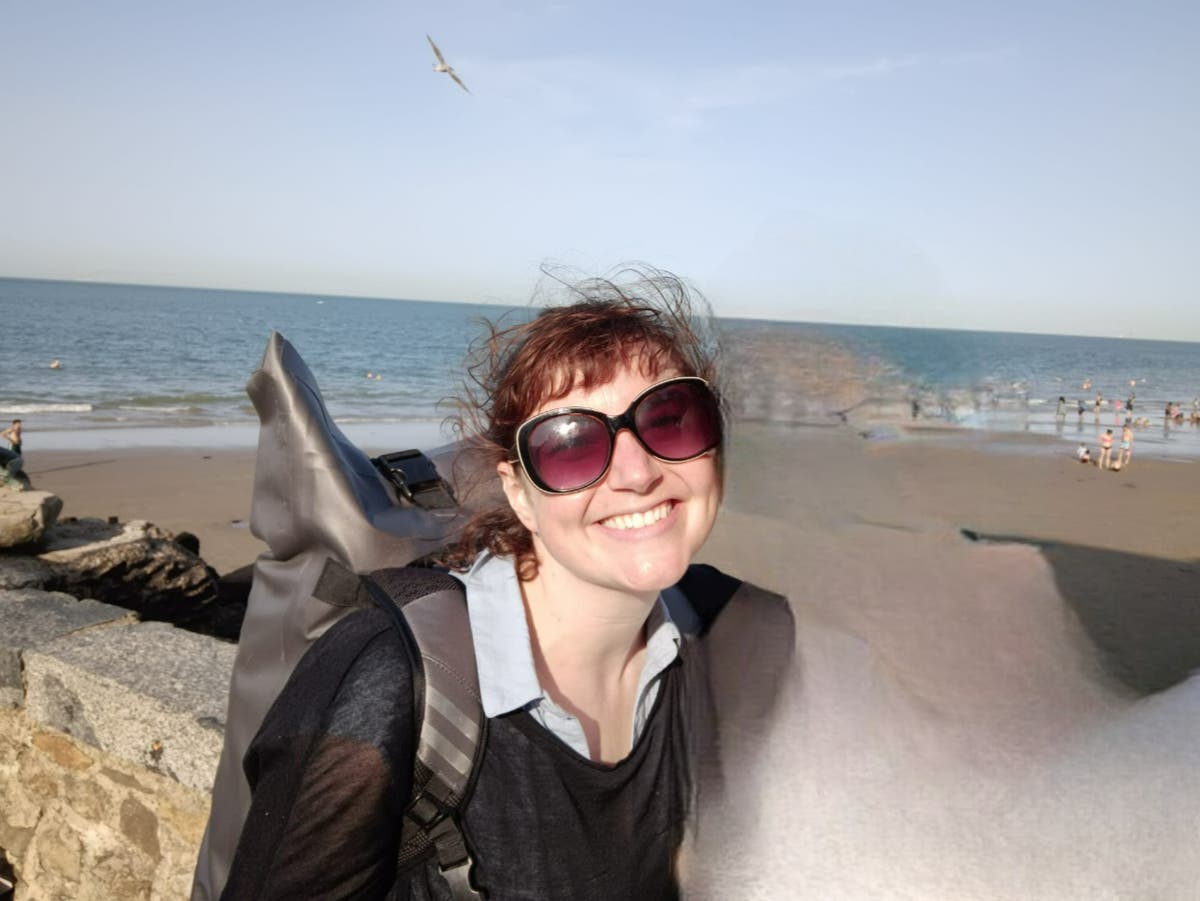It was midnight at chef José Andrés' headquarters on the Mediterranean island of Cyprus when the news arrived. The first details were quite scary, but very quickly they became completely catastrophic.
Seven staff members of World Central Kitchen, the humanitarian aid group founded by Andrés that has been working frantically to bring food aid to Palestinians in war-torn Gaza, were killed Monday night in airstrikes on their convoy near from the city of Deir al Balah.
Blood-stained British, Polish and Australian passports of international aid workers after Israeli airstrikes on a humanitarian convoy. Israel says the attack was a mistake.
(Abdel Kareem Hana / Associated Press)
Later, speaking by phone to a Los Angeles Times reporter who had recently visited the World Central Kitchen operation in Cyprus, a secondary base for the Gaza aid operation, Andrés's voice was rough with pain and grief.
“Those we lost today were more than colleagues: they were friends,” said the 54-year-old Spanish chef, whose voice still strongly carries the tone of his homeland.
The group announced hours after the attacks that it would suspend its work in Gaza.
More than 15 years earlier, Andrés had begun to channel his status as a celebrity chef into tireless work in the most desperate places in the world, plagued by natural and man-made disasters.
Their mission: feed the hungry.
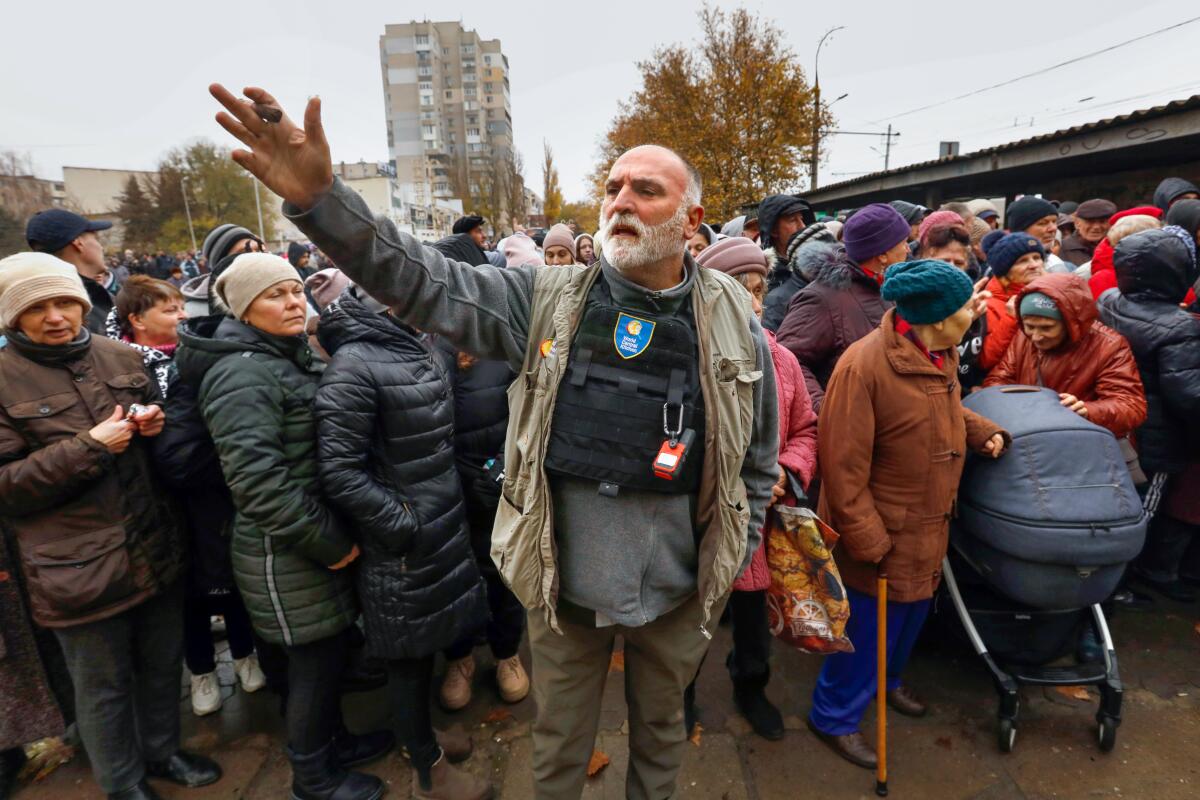
José Andrés is among hundreds of people lining up for food in Kherson, Ukraine, one of eight places his group opened in the city after it was liberated from Russian forces in 2022.
(Carolyn Cole / Los Angeles Times)
Israel has acknowledged responsibility for the attacks that killed World Central Kitchen workers, saying they had not been intentional.
“There was a tragic case in which our forces unintentionally attacked innocent people in the Gaza Strip,” Prime Minister Benjamin Netanyahu said Tuesday. “It happens in war; we are looking into it thoroughly.”
The prime minister said Israel was in contact with the governments of those killed and that “we will do everything possible so that this does not happen again.”
Gaza faces famine, the United Nations and other aid groups have said, a consequence of the devastating war that broke out when attackers from the Palestinian militant group Hamas led an attack on communities and a music festival in southern Israel, killing about 1,200 people.
In the intervening weeks, Israel attacked the 25-mile-long Gaza Strip with airstrikes, leveling entire neighborhoods, and sent ground troops to try to pursue Hamas in its long and elaborate network of tunnels. Nearly 33,000 Palestinians have been killed and Israel has faced a huge wave of global revulsion over the scope and scale of the attacks.
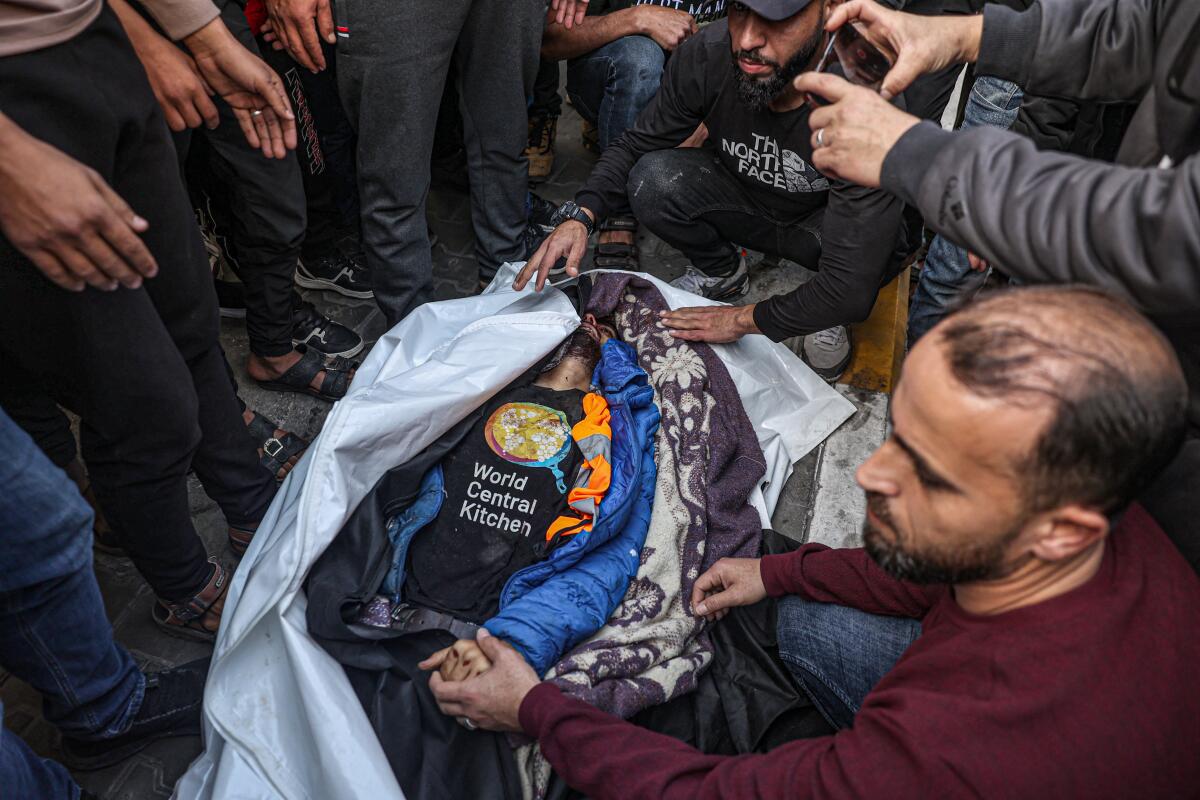
Family and friends mourn over the body of Saif abu Taha, a staff member at the aid group World Central Kitchen who was killed in Israeli airstrikes that hit a humanitarian convoy.
(Anadolu Agency)
Amid the constant threat of airstrikes, aid workers in Gaza often coordinate with Israeli authorities to deliver food and other supplies. World Central Kitchen said in a statement that it had done just that before the handover, informing the Israel Defense Forces about the movements of its personnel.
When the convoy (two armored vehicles and another vehicle) was hit, workers had just finished dropping off more than 100 tons of food at a warehouse in Deir al Balah, the group said. In the hours after the attack, gruesome videos showing the vehicles' insignia circulated on social media.
As the war in Gaza approaches six months, the humanitarian situation has become a full-blown crisis. Even as needs in the small enclave increased, ground deliveries decreased and air drops proved woefully inadequate. Andrés began to think about how to get a boat, load it with aid, and send it on the 200-mile journey to Gaza.
In theory, the idea was simple. And the Open Arms, a venerable tugboat converted into a rescue ship, and her crew from the Spanish charity Proactiva Open Arms were already docked in the calm waters of the Cypriot port of Larnaca.
But everything else about the plan seemed impossible: Even assuming the Israelis gave permission to pass through the near-total blockade they imposed on Gaza since October 7, the enclave had no deep-water port and the fishing port in the city of Gaza was attacked. in two places and full of destroyed boats, according to satellite images that Andrés had received in recent days.
Furthermore, even if a ship did reach shore, it would still have to find a way to unload aid and depart without Gaza residents rushing toward it on the way out and risking Israeli fire.
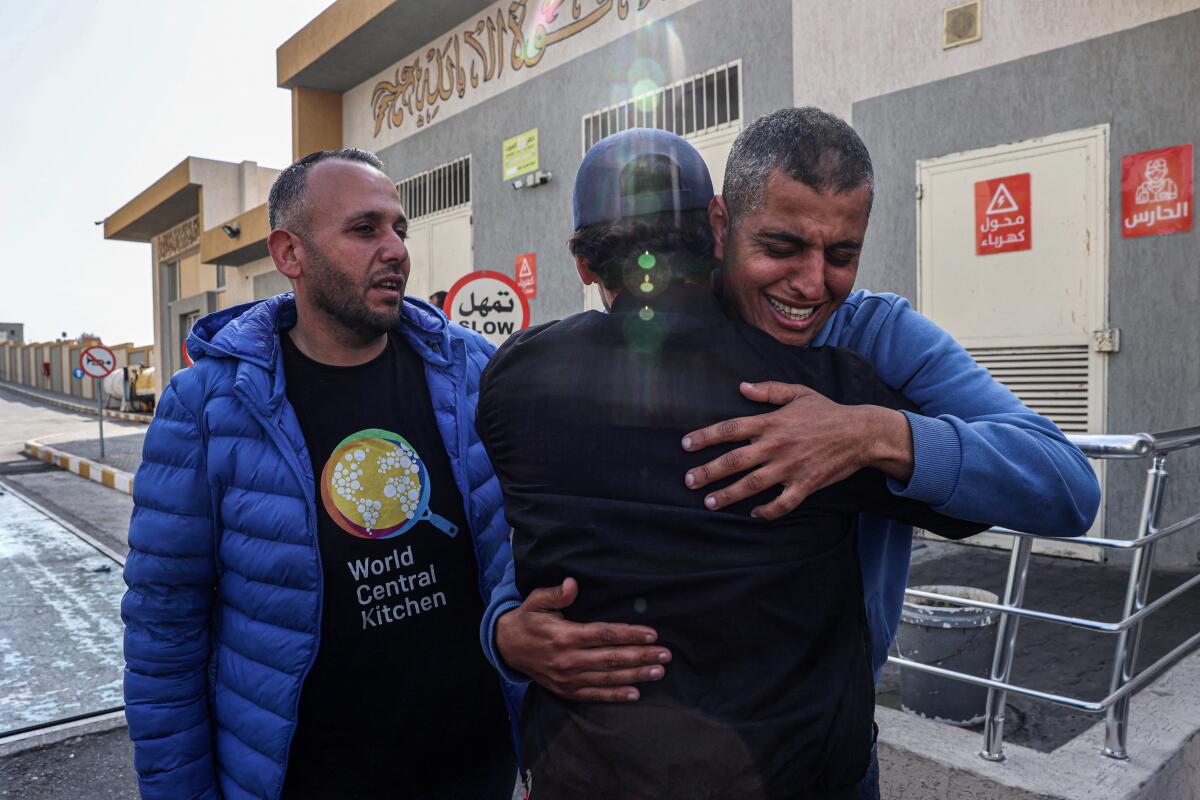
Family and friends mourn the death of Saif abu Taha.
(Khatib / AFP/Getty Images said)
Until now, everyone had told Andrés (he was in contact with Israeli officials every day and had just arrived from a trip to Tel Aviv to meet with the Israeli army) that it was impossible. But when the Los Angeles Times visited his operation in Cyprus in mid-February, he brimmed with his characteristic deep-voiced enthusiasm.
“We are going to receive criticism, but if this works, we will send 200 tons of food to Gaza,” he said, leaning on a panel on the bridge of the Open Arms, as the sun reflected off the sea on his face. .
World Central Kitchen already operated 67 kitchens in Gaza, it said, including those in the northern strip, where needs were most pressing. But food was running out and truck deliveries weren't arriving fast enough.
“Look, at the end of the day, I can be [complaining] about why not, or I can try,” he said. “The point is to show that it can be done. To shake up governments and other aid organizations.”
Andrés turned to Sam Bloch, emergency response director for World Central Kitchen, who was Googling “barges” to find a platform the group could load with pallets and take to Gaza. A 66-by-39-foot barge could carry 250 pallets, but would triple the trip time to 60 hours, assuming good weather. Then came the hard part, Bloch said.
“What worries me is that no navy wants to send people ashore. So we can take care of the last mile. …We are neutral. We will do it.”
World Central Kitchen has been active in the region since the start of the conflict and says it has provided more than 43 million meals to Palestinians in Gaza, operating from two main kitchens: in the southern city of Rafah, and Deir al Balah, in the center. Loop.
In addition, it supports dozens of community kitchens that serve more than 170,000 meals daily. Work accelerated during Ramadan, the holy month in which Muslims traditionally observe a dawn-to-dusk fast, interrupted by what in normal times would be a sumptuous meal.
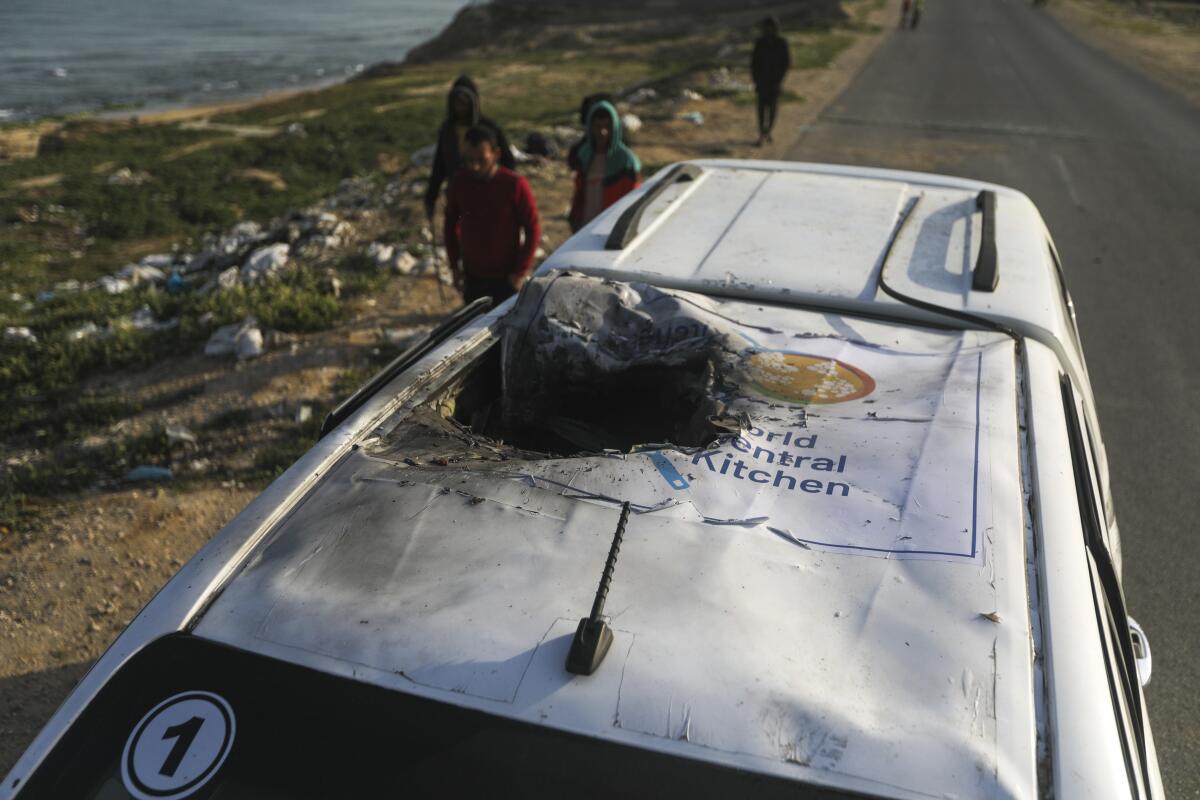
Palestinians inspect a vehicle with the World Central Kitchen logo destroyed by an Israeli airstrike.
(Ishmael abu Dayyah / Associated Press)
The airstrikes drew swift condemnation from international aid groups and signaled demands for more information from the governments whose citizens were killed.
Among the dead was a Palestinian from Gaza. The rest included dual citizens of the United States and Canada and others from Great Britain, Australia and Poland.
At a White House briefing, spokesman John F. Kirby said the Biden administration was “outraged” by the deaths and called the incident “emblematic of a larger problem and evidence of why aid distribution in Gaza has “It's been so difficult.”
Kirby noted, however, that there was no evidence that the attack was deliberate and said that Israeli officials had “publicly indicated that they are responsible.”
Britain's Foreign Secretary David Cameron called the deaths “completely unacceptable.” Canada said it expects “full accountability.”
Before the deadly episode, Israel had already faced widespread criticism over the Gaza war, including accusations of genocide brought before the International Criminal Court and a UN Security Council resolution calling for a ceasefire.
The deaths in the airstrike came as Israelis have been taking to the streets in large numbers in Tel Aviv and Jerusalem to demonstrate against Netanyahu, angry that the prime minister has failed to free more than 100 Israelis still believed to be held. in Gaza after being captured by Hamas. militants led on October 7.
Many feared that the deaths of the aid workers would lead to further punishment of Israel from the outside world.
“I'm sure it will have a lot of repercussions,” said protester Mike Agur, 77, of Tel Aviv. “Many countries will be angry.”
Over dinner during the Los Angeles Times' visit to Cyprus, Andrés made an eerily prescient comment about coordination with the Israelis and the extreme danger of delivering aid in a fierce battle zone.
“I don't want to get hit,” he said. “And I don't want things to be destroyed.”
But he was passionately animated as he described the Palestinians who worked in the group's neighborhood kitchens, saying they embodied the spirit of the organization in its most difficult times.
“The only thing you have in a disaster zone are hands. People,” she said. “We thrive in these situations and put everyone to work.”
Bulos reported from Aqaba and King from Washington. Times photojournalist Marcus Yam contributed to this report from Tel Aviv.

